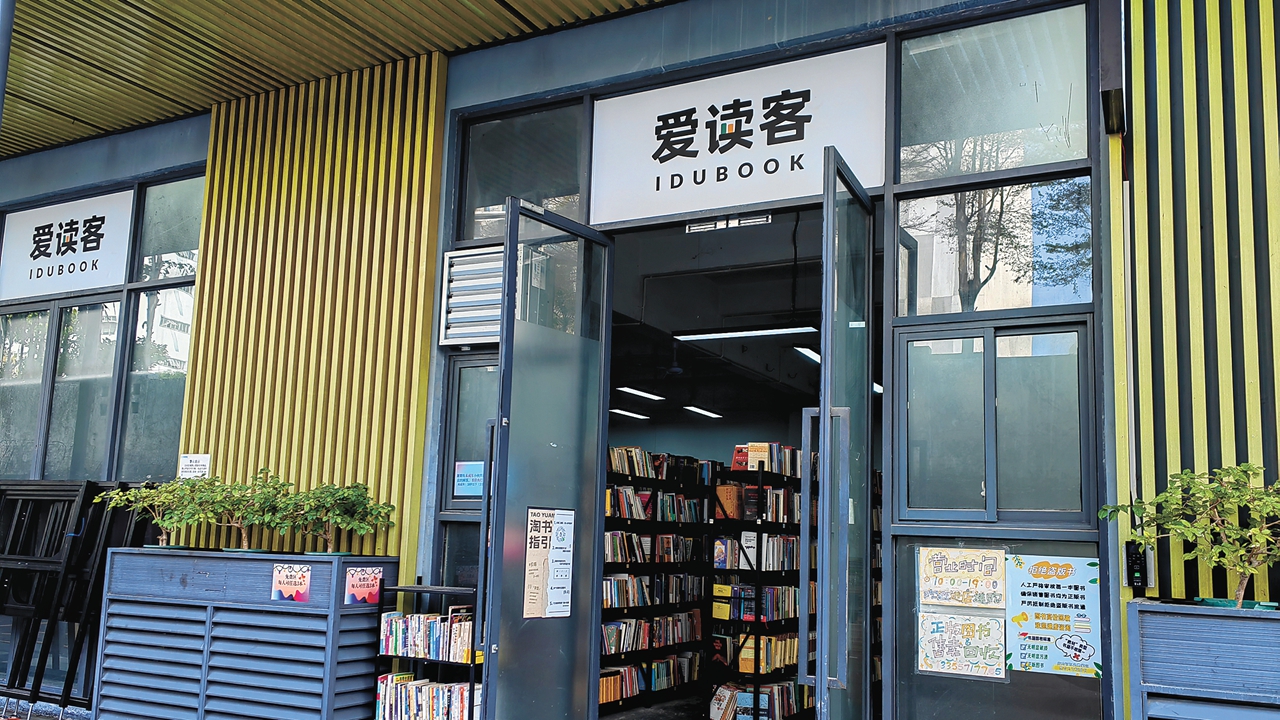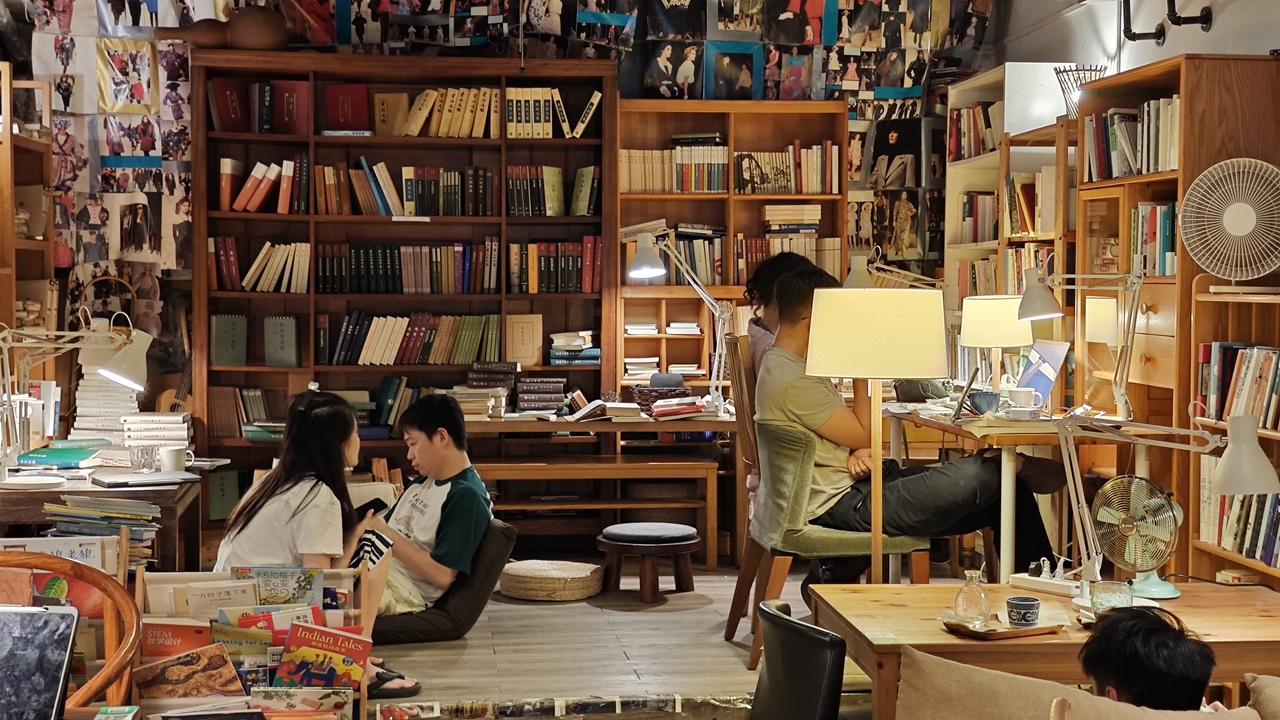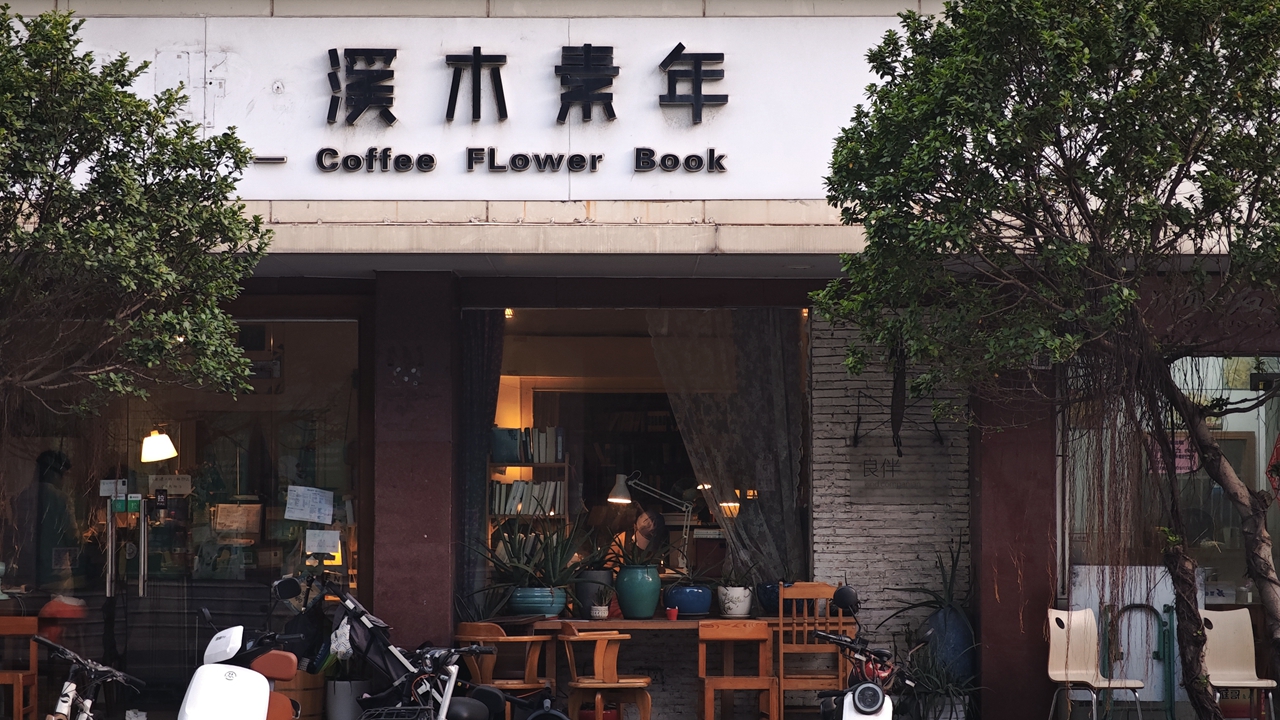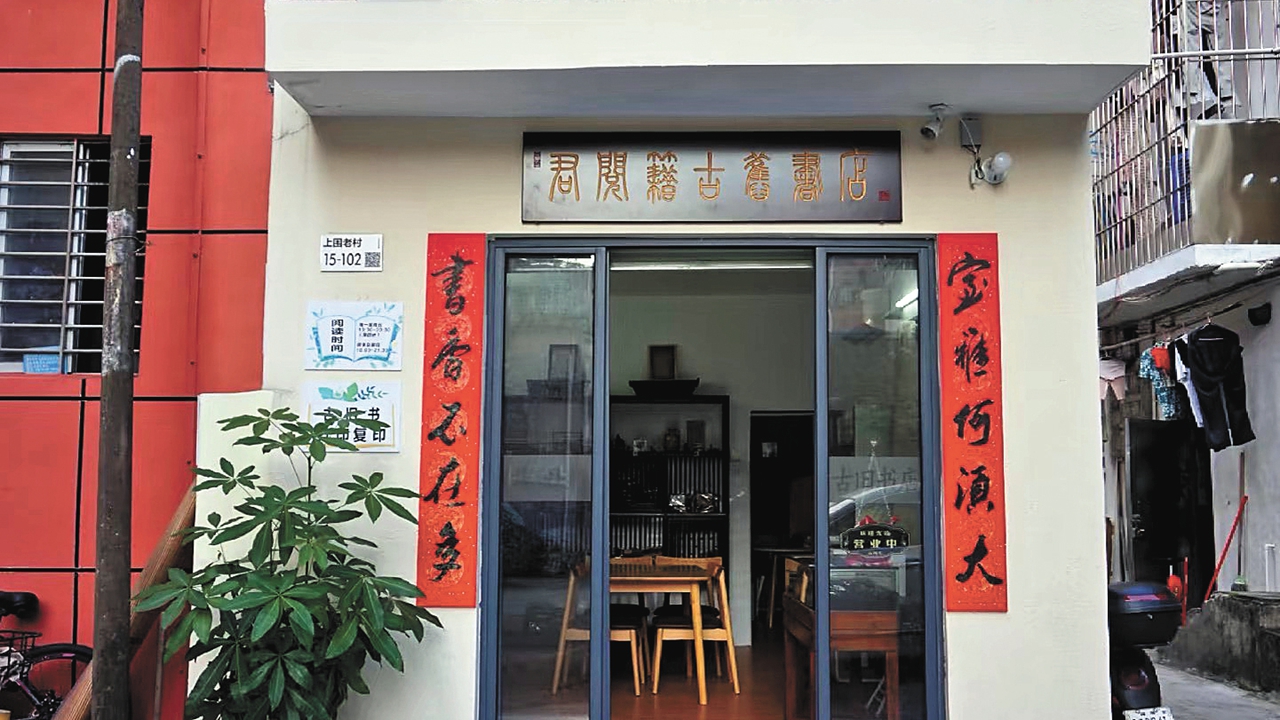Off the beaten path: Exploring Shenzhen's secondhand bookstores
Writer: Wei Jie | Editor: Rao Guoting | From: Original | Updated: 2025-07-22
In Shenzhen, towering skyscrapers and bustling streets are a familiar sight. Yet, tucked away in various corners of the city, be it beneath old residential buildings or nestled deep within a bustling industrial park, secondhand bookstores act as quiet refuges seemingly forgotten by time.
Playing an indispensable role in Shenzhen’s reading community, they carry the city’s rich reading legacy, reflect an evolving reading culture, and add a special cultural flavor to the acclaimed “City of Reading.”
While most seem modest, including worn exteriors, their distinct character invites residents to explore their treasures and find solace hidden within the pages of well-loved books.

The front door of iDubook in Nanshan District. File photo
Books only at iDubook
(Add: #104 Yangguang Industrial Park, Xili Subdistrict, Nanshan)
Nestled within a logistics industrial park in Nanshan’s Xili Subdistrict, iDubook is dedicated solely to books. The store’s name, which can be phonetically translated into “love reading books” in English, forgoes embellishments like a coffee bar or trendy cultural products.
Instead, its quiet, 300-square-meter space is filled with one thing — a vast collection of more than 50,000 books. “When there are no customers, I can just sit relaxed at the entrance, reading a book that interests me. It’s very chill,” said Zhao Qingmeng.
Facing fierce competition from online bookstores, many brick-and-mortar bookstores have diversified their offerings with coffee or cultural products to survive and turn a profit. But iDubook has survived just fine without doing the same.
Zhao said that the store has a rapid turnover, selling more than 3,000 copies per month on average. “We have managed to break even and are now generating a small profit.”
Before launching the store, Zhao and his business partners had agreed to focus exclusively on selling books. “I had faith that a book-only business model is viable, and it’s proven correct. Our customer base has continued to grow since opening. We can indeed make a profit by selling only books.”
Previously based in Hangzhou, Zhejiang Province, Zhao himself is a passionate book lover with a large personal collection. He sought a way to pass books he had finished reading to others who would appreciate them.
Inspired by the distribution model of Japanese secondhand book dealer Book Off, Zhao created a self-funded secondhand book website in 2005 while working at a foreign-funded enterprise in Hangzhou. After over two years of running the site, he gained extensive experience in the secondhand book trade.
In early 2020, Zhao left his corporate job to devote himself full-time to establishing the iDubook platform, which enables customers to buy and sell secondhand books through its mini program or the offline Hangzhou store. His iDubook platform quickly gained popularity among book lovers.
At the start of 2024, Zhao decided to open a second store in Shenzhen. It took only one weekend to finalize the location. “Before opening, we conducted a statistical survey and found that Shenzhen is among the cities with the highest number of book enthusiasts nationwide.”
Zhao has been overwhelmed by the city’s passion for books at the Shenzhen store. “There have been many occasions when customers called and asked for specific books to be delivered to their addresses. They don’t mind paying high delivery fees — they just wanted to read the books. And this happens quite often.”
Although Zhao’s store is not in a prime location in Nanshan District, many customers still visit after hearing about the bookstore through word-of-mouth, with some purchasing nearly 100 books at a time.
“Initially, we just wanted a postal address for receiving and delivering books. This Xili location within an industrial park is cost-effective enough to justify. However, we were quite surprised to find that many customers were willing to come and visit us. So we refurbished the interior and added a reading area for a better experience,” said Zhao.
Most of the books at iDubook are priced at 30% to 40% of their original retail price, and Zhao said they are committed to trading exclusively copyrighted books. “This is our bottom line at iDubook.”
According to Zhao, every single book received is manually verified by iDubook staff to ensure it is not a counterfeit. He explained that they usually differentiate genuine books by examining factors such as weight, material quality, cover design, illustrations, printing quality, and anti-counterfeit pages.
To date, iDubook has handled several hundred thousand books, accumulating extensive experience in copyright verification. “We are almost 100% certain whether a book is pirated the moment we hold it in our hand,” said Zhao, adding that any counterfeited books are promptly disposed of and never sold.
When asked about the types of books iDubook accepts, Zhao noted that whether a book is a bestseller is not the main consideration. “Our goal is to collect as many different books at possible. If we don’t have a particular title in stock, we will purchase it even if it isn’t an easy sell. We will display it in our store regardless. Who knows? Maybe many years from now, people will start looking for that book.”

Readers spend time in Coffee Flower Book. Photos by Wei jie except otherwise stated
Coffee Flower Book
(Add: 1/F, Shunfa Commerce Building, Gongye Road I, Nanshan District)
“I feel like I’m in a bookstore straight out of an anime,” said a young woman as she read an English original of “The Bourne Identity” by American novelist Robert Ludlum.
Unlike the polished commercial bookstores in upscale shopping centers, Coffee Flower Book, tucked away near Shekou Port in Nanshan District, has an untamed charm with its assortment of old furniture. The bookshelves, varying in color and shade, were collected by store manager Yang Cong from secondhand furniture markets and exude rustic warmth.
The books are not neatly arranged on shelves, but are piled up in various spots throughout the store. Though seemingly messy, this arrangement adds to the joy of hunting for hidden gems. Scattered among the towering piles of books are several desks and comfortable armchairs, creating a quiet, cozy ambiance for visitors.
Despite its modest storefront and unremarkable location in a neighborhood easily overlooked by passersby, this independent bookstore that sells secondhand books collected from various sources has gained popularity online over the years.
Weekend crowds have steadily increased, with many readers spending entire days browsing for rare finds. They often comment that such a comfortable, down-to-earth secondhand bookstore is now a rare gem in Shenzhen.
Stepping inside, visitors are greeted by the unique scent of old books, and time seems to stand still. “I wanted to create a bookstore that feels personal, grounded, and full of warmth rather than simply following a ‘fixed pattern,’ just like those old, time-honored shops in Shekou,” said Yang.
Before opening Coffee Flower Book in 2019, Yang had run a secondhand bookstore online and developed extensive knowledge about books. Now he curates a more than 10,000 volume collection, which primarily focuses on humanities and social sciences but also includes foreign literature, history, and art. “I select books mostly based on my personal preference,” Yang noted.

A view of Coffee Flower Book, located near the Shekou Port in Nanshan District.
Coffee Flower Book also offers a welcoming space for reading. Quotes about reading, such as Henry David Thoreau’s “A passage that leads straight to solitude in reading,” are seen throughout the store.
Members of the bookstore can borrow books to take home. Initially, Yang hoped to foster a community bookstore model, connecting people and books and maintaining a core group of about 1,000 readers. However, he soon realized that this model was unsustainable. As a result, he started promoting the store online, attracting many book enthusiasts to visit regularly.
A former UI designer, Yang wanted his store to always feel warm and welcoming, offering people a sense of the human touch. He designated a specific area where customers can eat takeout food. During the day, the store also serves as a place for study and reading, allowing people to quietly focuses in their own corners. Every Saturday night, the bookstore screens movies at a rate of 19.9 yuan (US$2.79) per person.
Jun Yue Ji Gu

The entrance of Jun Yue Ji Gu Secondhand Bookstore in Longgang District. File photo
Secondhand Bookstore
(Add: No. 15-102 Shangwei Ancient Village, Longgang District)
Nestled in an ancient village in Longgang District lies Jun Yue Ji Gu Secondhand Bookstore, which has been dubbed “the Store of One Person’s Antique Books.” Within, visitors can find thread-bound books dating to the Ming and Qing dynasties, Japanese woodblock editions, books printed during the early 1900s, and secondhand out-of-print books neatly arranged on the shelves.
Grain coupons, passes, business licenses, student ID cards, work permits, and other documentary paper items are framed and hung on the walls, serving as unique decorations throughout the bookstore.
The bookstore was established by He Junru, a Shenzhen native born in the second half of 1980s. Previously a professional tour guide, she traveled extensively in more than 20 countries where she eagerly sought out local bookstores and gradually amassed a large collection of antique books.
Driven by her passion for old books and after specifically traveling to Xi’an to learn from other bookstores specializing in old books, He invested more than 200,000 yuan to set up the Jun Yue Ji Gu bookstore in July 2022.
Transformed from a breakfast eatery, the bookstore currently houses more than 2,000 old books, 300 volumes of thread-bound antique texts, and over 1,000 documentary papers. Some, which the owner intentionally collected, showcase the cultural heritage of Shenzhen, including books connected to the Liu Zhubo family of Pinghu Subdistrict, Longgang District.
Even though her store is supported by her family, freeing her from the burden of rent, He admits that she has to take on part-time work to make ends meet. Nonetheless, she feels inspired whenever her collection of antique books is loaned to cultural institutions, such as museums and memorials, for exhibitions.
She recalled encountering a Traditional Chinese Medicine (TCM) practitioner who showed great interest in her ancient TCM books but was deterred by the prices. He offered to lend him a book, which the practitioner returned after a week. The practitioner then asked to borrow another book and returned it a week later, repeating this pattern over the following months.
“I found it strange and asked if he could really finish reading a book so quickly. He told me that he had copied the book by hand before returning it so that he could study them thoroughly afterwards,” said He. “It really surprised me that nowadays, people are willing to copy a book by hand.” This experience has strengthened He’s determination to keep the bookstore running.